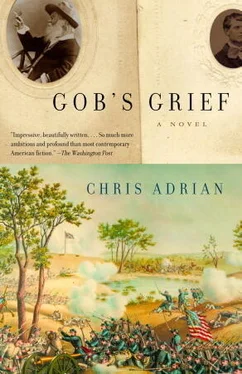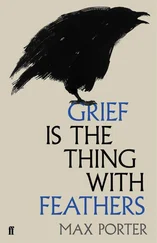“New York agrees with me,” Walt said to Tennie at the party, looking around for Gob but failing to find him. Mrs. Woodhull’s house was not so large as her son’s, but it was much prettier. The guests were gathered in two large parlors, the walls of which were hung with purple velvet and white silk. White roses were everywhere, in vases and in pots, strung along banisters, and even hanging from the ceiling in flower-chandeliers. “This is a fine house. I think it must be roomier than your house in Great Jones Street.”
“Great Jones Street?” said Tennie. “Did we ever live in that dismal alley?” A man came up to them, a great big tall well-gristled fellow in a black suit. He took Tennie’s hand and kissed it, then looked at Walt coolly.
“Dr. Fie,” Tennie asked, “have you met Mr. Whitman? He’s Gob’s dear friend, you know. And mine too. Mr. Whitman, Dr. Fie is also a friend of our Gob.” Walt put his hand out for the doctor to shake. Dr. Fie considered it a moment before he took it.
“I’m a physician,” Dr. Fie said, shaking Walt’s hand hard and slow. “What’s your profession, Mr. Whitman?”
“I write poems,” Walt said.
“Mr. Whitman took care of our sick boys during the war,” said Tennie. “Didn’t you, Mr. Whitman?”
“Did you?” asked Dr. Fie. His smile was not friendly. “No doubt you healed them with verse.”
“I gave them the medicine of daily affection and personal magnetism,” Walt said.
“Very efficacious, I’m sure,” said Dr. Fie.
“Dr. Fie,” said Tennie, “do you doubt that magnetism is strong medicine?” She put out her finger and poked Dr. Fie in his broad chest and he leapt up, as if shocked. Tennie threw her head back and laughed very loud. This attracted her sister, who stepped gracefully across the room, nodding and smiling at her guests, until she came to where Walt was standing.
Mrs. Woodhull nodded at her sister and Dr. Fie, then asked Walt to walk with her. Walt was afraid she might ask him again to endorse her bid for the Presidency of the United States in 1872: She had declared herself a candidate back in April, in a letter to the Herald.
“Isn’t Tennie a delight?” she asked, but before Walt could answer she started talking about the late war between the French and the Germans. She said Louis Napoleon fully deserved his defeat.
“Yes,” said Walt. “Even with all his smartness, I consider him by far the meanest scoundrel that ever sat upon a throne.”
“It’s cheered Gob,” said Mrs. Woodhull. “To have all the killing done with.” She leaned over and whispered in his ear. “Yet he seems a little gloomy, this evening. Would you investigate the cause?” They rounded a giant fern, whose drooping branches were hung with roses. Gob was sitting alone on a deacon’s bench. “Well, Mr. Whitman. I hope I will be in Washington this winter. You may expect me to call on you.” Mrs. Woodhull gave him a little push towards Gob, who did indeed look gloomy, though earlier in the day he’d been very happy. He and Walt had had one of their customary walks along the river, and the sight of all the German steamers covered with bright flags had made Gob caper.
“Hello!” Walt said as he sat down. “I thought I’d lost you.”
“I’m just having a rest.”
“You’ve been mighty cruel to that flower.” Gob had taken a rose from the fern and plucked out all its petals. They were scattered on his lap.
“Yes,” said Gob. He took the petals up and began to manipulate them, rolling them into tiny cigar shapes and tying them together end to end. “How do you like the party?”
“It is more subdued than I expected. I thought there would be more emancipated dress. More Free Love. More people hanging upside down from the ceiling shouting out revolutionary slogans. I thought Dr. Graham would be here, peddling his sawdust muffins. Did you know your Aunt Tennie is the author of a pamphlet? She gave me a copy.” Walt took it out of his pocket— The Non-Participatory Female, and Other Natural Abominations.
Gob laughed. He took the pamphlet and put it in the fern pot. Then he went back to weaving the petals. Walt watched silently. For five minutes, Gob’s nine fingers made a quiet frenzy of obsessive, repetitive motion. When he was finished, he took Walt’s hand and tied the bracelet around it. “There, my friend,” he said. “A present for you.” Walt held his hand up, pulled at the bracelet. It was as strong as any good yarn. Hank spoke: Camerado, I give you my hand! I give you love more precious than money, I give you myself before preaching or law; Will you give me yourself? Will you come travel with me? Shall we stick by each other as long as we live?
“Thank you,” Walt said.
“It’s just a trinket,” said Gob. “Don’t get all sobby-eyed. Look here, I need your opinion.” He leaned across Walt and spread the branches of the fern, revealing a scene from the party: a young lady in conversation with a hideous man. Walt knew the man. It was ugly Benjamin Butler, the congressman who had wanted so badly to evict Mr. Johnson from his fancy house. Walt didn’t know the young lady. She looked to be about twenty-five years old, and was very small and dark.
“Do you see her?” Gob asked. “Do you think that girl is pretty?”
“My boy,” said Walt. “Princess Ugly of Ugly sur Ugly could stand next to Ben Butler and seem beautiful merely by comparison. She’ll have to stand away from him before I can make a proper judgment.”
Just then the doorbell rang, and from the guests a little cry went up proclaiming that Steven Pearl Andrews had arrived. Walt and Gob joined the crowd that gathered around the door to the parlor to greet him. A welcoming round of applause went up, louder and louder until a servant came into the room accompanied not by Mr. Andrews but by a small, skinny figure with a broken hat on his head and a dirty bag in his hand. The applause wavered. Perhaps because the man did not know what else to do, or perhaps because he was drunk, he took off his broken hat and bowed deeply. Tennie said, “Doc!” but didn’t go forward to greet him. It was Walt who did that.
“Dr. Woodhull,” Walt cried. “It is a great pleasure to see you again!” There was a stir among the guests, but nobody called for him to be thrown out, though he looked like a sandwich-board man and smelled like decay. He was desperate and drunk and charming, come back to his wife because he had heard of her fame from far away, and because he had nowhere else to go. Mrs. Woodhull received him graciously. So did her second husband, Colonel Blood, who took him upstairs to bathe and change, and gave him a too-big suit to wear until he could get some good clothes of his own.
Dr. Woodhull turned out to be the star of the party, telling hospital stories to Dr. Fie, talking about Armory Square with Walt, and scolding Mr. Butler for insulting the honor of the women of New Orleans. Everyone was kind to him save Gob, who wouldn’t speak to him, and barely would look at him. Gob went back to his seat by the fern, and Walt stayed with him while he glowered at the floor.
“Who cares about that ridiculous drunk?” he said. “ I am Dr. Woodhull.”
Walt saw Mrs. Woodhull present her memorial to the combined Judiciary Committee of both houses of Congress in January of 1871. Tennie came with her, as did the young woman Gob and Walt had seen talking to Ben Butler at Mrs. Woodhull’s September party. The three women all wore like attire: dark blue skirts and masculine coats, shirts, and ties. From the waist up they seemed to be dressed as men. Walt considered their three identical alpine hats, tipped at identical angles, and thought of Dr. Mary Walker. She would never have worn such a hat.
Читать дальше












